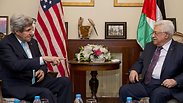
Abbas, Kerry speak ahead of Palestinian unity government formation
PA president tells US secretary of state intra-Palestinian moves should not affect diplomacy with Israel; Kerry 'expressed concern' with Hamas; two are expected to meet on Wednesday in Amman.
Kerry and Abbas were expected to discuss the now-defunct Israeli-Palestinian peace process as well as the Palestinian reconciliation and the formation of a unity government, senior Jordanian government official told the Jordanian paper.
Abbas also called Kerry Sunday, ahead of Monday's announcement of the Palestinian unity government, casting the intra-Palestinian moves as a domestic matter that should not affect wider diplomacy with Israel and the West.
Related stories:
- Kerry and Abbas meet for first time since peace talks collapsed
- US: Abbas and Kerry held 'constructive' talks in Jordan
- Abbas: Unity government won't take part in peace talks
Abbas told Kerry "the coming government will be formed of independents and will represent the political agenda of the president," the official Palestinian news agency WAFA said.
Kerry, who oversaw the peace talks that stalled in April, "expressed concern about Hamas's role in any such government and the importance that the new government commit to the principles of nonviolence, recognition of the State of Israel, and acceptance of previous agreements with it," the State Department said in a statement.
Abbas assured Kerry that "the new government would be committed to these principles," State Department spokeswoman Jen Psaki said in the statement.
Abbas said on Saturday that Israel "informed us ... they would boycott us if we announced the government". Netanyahu, in his brief statement on Sunday, made no reference to any Israeli sanctions.
American sources said Sunday that the Obama administration has yet to make a decision on whether or not to recognize the new Palestinian government.
Earlier Sunday, Prime Minister Benjamin Netanyahu urged world leaders not to rush to recognize the new Palestinian government.
"I call on all responsible elements in the international community not to rush to recognize a Palestinian government which has Hamas as part of it and which is dependent on Hamas," Netanyahu, who has said such an administration would be a front for the Islamist group, told his cabinet.
"Hamas is a terrorist organization that calls for Israel's destruction, and the international community must not embrace it. That would not bolster peace, it would strengthen terror," Netanyahu added.
Israel froze US-brokered peace talks with Abbas when the unity deal was announced on April 23 after numerous unsuccessful attempts at Palestinian reconciliation since Hamas seized the Gaza Strip from Fatah forces in fighting in 2007.
Israel's security cabinet met Sunday evening to discuss the Hamas-Fatah reconciliation.
A government official said the Palestinian unity government was "unacceptable" as far as Israel was concerned, and that "we have no reason to hold a dialogue with it."
Abbas said on Saturday that Israel "informed us ... they would boycott us if we announced the government". Netanyahu, in his brief statement on Sunday, made no reference to any Israeli sanctions.
Israel has withheld tax revenues from Abbas's aid-dependent Palestinian Authority, which exercises limited self-rule in the West Bank, in retaliation for his signing in April of international conventions and treaties after Israel reneged on a promised release of Palestinian prisoners.
On Saturday, a Palestinian official said Israel had denied requests by three Gaza-based Palestinians expected to be named as ministers to attend the new government's swearing-in ceremony in the West Bank.
Abbas has said a joint government with Hamas would continue to abide by his policy of recognizing Israel, though the Islamist group insists it would not change its own policy of rejecting Israel's existence.
He has been keen to assure Western donor countries he will remain the key Palestinian decision-maker and that security coordination between his forces and Israel will continue.
Both Fatah and Hamas see benefits to a unity pact, though disagreements have blocked them from achieving such a government for years.
With a strict blockade imposed by neighbors Israel and Egypt, Hamas has been struggling to prop up Gaza's economy and pay its 40,000 employees. Abbas, for his part, wants to shore up his domestic support since the peace talks with Israel collapsed.
Attila Somfalvi contributed to this report.










